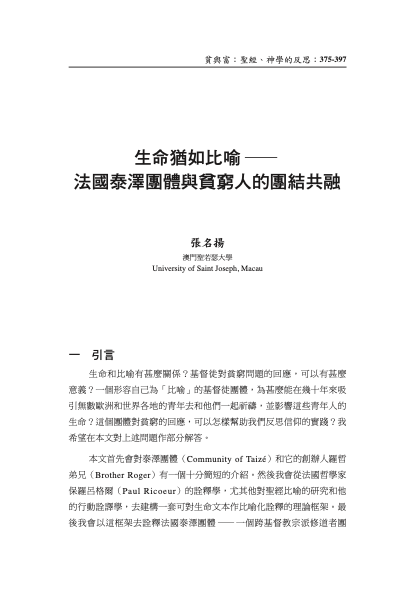生命猶如比喻—法國泰澤團體與貧窮人的團結共融/張名揚
張名揚 澳門聖若瑟大學人文學院兼任助理教授
撮要
本文嘗試運用法國哲學家呂格爾(Paul Ricoeur)的詮釋學,尤其他對聖 經比喻的研究和他的行動詮譯學,去解讀法國泰澤—一個基督教跨宗派修道者團體—對貧窮和苦難的回應。本文分析泰澤在貧窮人中間的行動,為何在基督徒之間及俗世社會中引起這麼大的回響。結合呂格爾對比喻和行動的詮釋,可以了解表面看來微不足道的行動,如何把「給貧窮人的福音 —上帝國來臨的好消息」更深更豐富的意義帶出來,以及由此反思基督徒以信仰實踐回應貧窮和苦難的一些可能性。比喻化的詮釋強調想像力和創意,因此能幫助基督徒「應用」經文時避免簡單地「複製」經文的內容,而留意文本、生命和處境間的互動關係,在回應普遍不公義的處境和信仰的要求時,作出有創造力的行動。
ABSTRACT
This article is an attempt to interpret the practical response of the Taizé Community in France to poverty and suffering, using the hermeneutics of the French philosopher Paul Ricoeur, especially his study of parables and his hermeneutics of human action. In this article, I analyze the things that Taizé has done among the poor to find out why it is so influential in the secular society as well as among Christians. Through a reading which combines Ricoeur’s hermeneutics of parable and his hermeneutics of action, we can understand why small and seemingly powerless actions may bring out the deeper and richer meaning of “the coming of the Kingdom of God as good news for the poor.” Reading the life of the Taizé community as parable will help Christians reflect on the possibilities of responding to poverty and suffering in action. Since parabolizing interpretation emphasizes imagination and creativity, it can help Christians avoid “copying” the content of the Scriptures in their application. Instead, Christians should pay attention to the interaction between the text, their lives, and contexts, in order to act creatively in response to the widespread injustice in their contexts and the demand of their evangelical faith.
原載於《建道學刊》41期(2014年1月),頁 375-398。
Latest Articles
新手牧者研究計劃(三):新手牧者的身心靈狀態 / 盧慧儀
2025 年 11 月 19 日
個體與關係:滕近輝思想中「深化」的靈性觀 / 倪步曉
2025 年 11 月 18 日
香港九龍塘基督教中華宣道會之起源和發展史/陳智衡
2025 年 10 月 20 日
Highlights
[電子書]困境與抉擇:「建道研究中心30週年誌慶」跨學科研討會論文集/廖炳堂、倪步曉主編
2025 年 1 月 2 日
從梧州到長洲:建道神學院125年的挑戰與恩典 / 陳智衡
2023 年 10 月 1 日
微小教會的見證/高銘謙
2023 年 6 月 1 日







